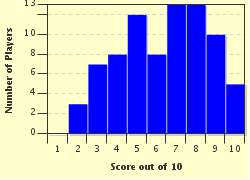Quiz Answer Key and Fun Facts
1. The Iceni lands to which Boudica belonged comprised what is now East Anglia. Which tribes did they share borders with?
2. The initial "invasions" of Julius Caesar to Britain took place in 55BC and 54BC. The Britons then lived in relative peace until the Claudian invasion of which year?
3. Boudica married and had two daughters with a King of the Iceni. Tacitus tells us he lived something of a charmed life, but what was this ruler's name?
4. Boudica has been known in many guises, her name having a multitude of variations but whether you know her as "Boudica", "Boudicca", "Bonduca" or "Boadicea" the root of these names remain the same; the ancient Celtic word "Bouda". The meaning of her name leads to her association with a much later monarch but, just what does it mean?
5. During the Boudican Revolt of AD 60/61 the Iron Age queen and her "barbarian" army lay waste to three Romanised towns. Today, these towns are known as Colchester, London and St. Albans but what were they known as in Ancient Britain?
6. In his writings Tacitus claims that Boudica took poison after her final defeat in battle but this claim has never been substantiated as her body has never been recovered. Why would Tacitus choose this particular end for this British heroine?
7. Boudica's revolt is well-known but before her rebellion she had a predecessor who ran a largely successful resistance campaign against the Romans until his eventual defeat and capture. Who was he?
8. We know that Boudica managed to sack three Romano-British towns, largely because the main bulk of the Roman legions were still in what is now Wales after their attack on the Isle of Mona. In other words they were too far away to offer any form of defence. However, although the exact location of Boudica's final defeat is unknown we do know the man who finally put a stop to her rebellion. What was this governor's name?
9. Boudica's name means "victory" so it is appropriate that in support of her uprising she appealed to one of the ancient British goddesses of victory, but which one was it?
10. Going by Tacitus' version of events we know that Boudica had two daughters and that they were raped by Roman soldiers at the same time as Boudica was being flogged. Rape is an outrage in itself but why would this instance be an especial outrage to an ancient Celtic community?
Source: Author
Seillean
This quiz was reviewed by FunTrivia editor
bloomsby before going online.
Any errors found in FunTrivia content are routinely corrected through our feedback system.

